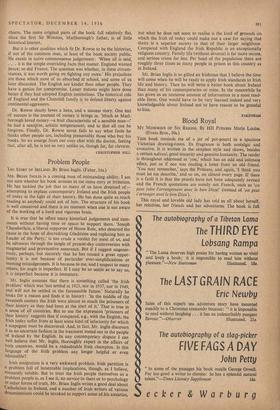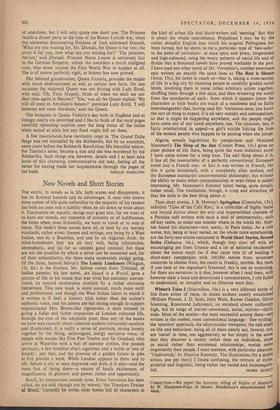Blood Royal
MY MEMORIES OF SIX REIGNS. By HH Princess Marie Louise. (Evans Bros., 30s.) This book reminds me of a jar of pot-pourri in a spacious Victorian drawing-room. Its fragrance is both nostalgic and evocative. It is written in the simplest style and shows, besides a certain naïveté, great sincerity and genuine humanity. The reader is throughout addressed as 'you,' which has an odd and intimate effect, just as if one was reading a letter from an old friend. 'You may remember,' says the Princess, and again, 'I think you must let me describe,' and so on, on almost every page. If there is a fault it is that the proofs have not been adequately revised and the French quotations are mostly not French, such as 'on peut faire !'arrangement avec le bon Dieu!' (instead• of 'on pew s'arranger avec le bon Dieu').
This royal and lovable old lady has told us all 'about herself, her relatives, her friends and her adventures. The book is full
of anecdotes, but I will only quote one short one. The Princess recalls a dinner party at the time of the Russo-Turkish war, when the somewhat domineering Duchess of Teck addressed Disraeli, 'What are you waiting for, Mr. Disraeli, the Queen is for you; the army is for you, now what are you waiting for?' The potatoes, Ma'am,' said Disraeli. Princess Marie Louise is extremely fair to the German Emperor, whom she considers a much maligned man, who never wanted the First World War to happen at all. She is of course perfectly right, as history has now proved.
Her beloved grandmother, Queen Victoria, provides the reader With much entertainment as well as certain new facts. On one occasion the widowed Queen was out driving with Lady Errol, who said, 'Oh, Your Majesty, think of when we shall see our dear ones again in Heaven 1"Yes,' was all the Queen replied. 'We will all meet in Abraham's bosom?' persisted Lady Errol. 'I will however not meet Abraham,' said the Queen.
The banquets in Queen Victoria's day both in England and at foreign courts are described and I like to think of the royal pages carefully spreading napkins over the long trains of the ladies when seated at table lest any food might fall on them.
A few inaccuracies have inevitably crept in. The Grand Duke Serge was not murdered by the Bolsheviks, but by an anarchist, some years before the Bolshevik Revolution. His beautiful widow, the Tsarina's sister, became a nun and she was murdered by the Bolsheviks. Such things are, however, details and I at least take leave of this charming, communicative old lady, feeling all the better for having made her acquaintance through the pages of











































 Previous page
Previous page